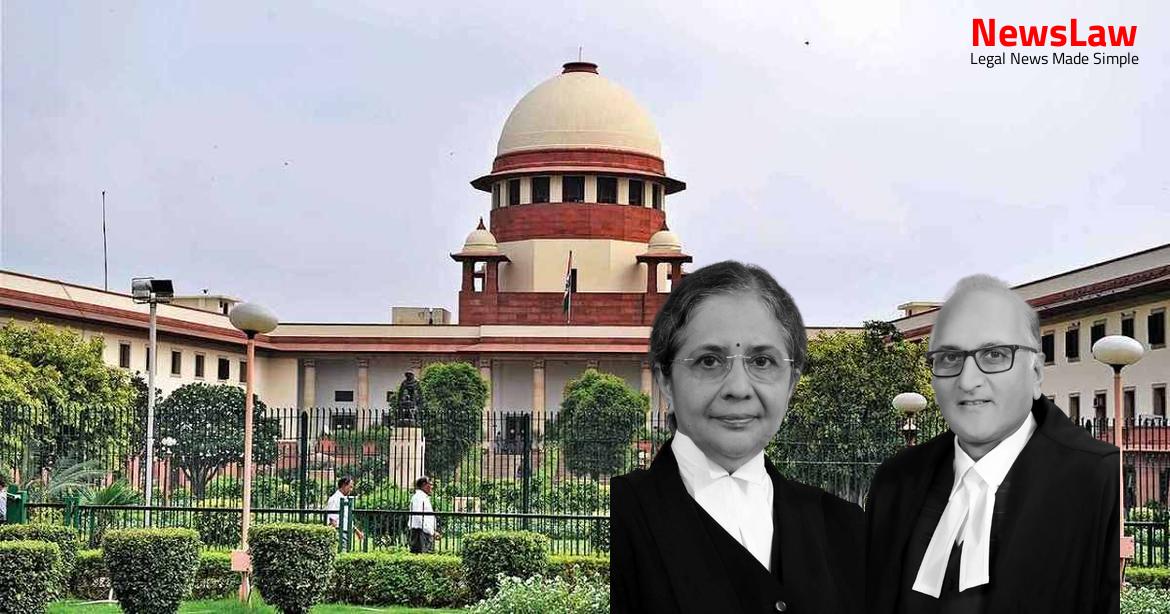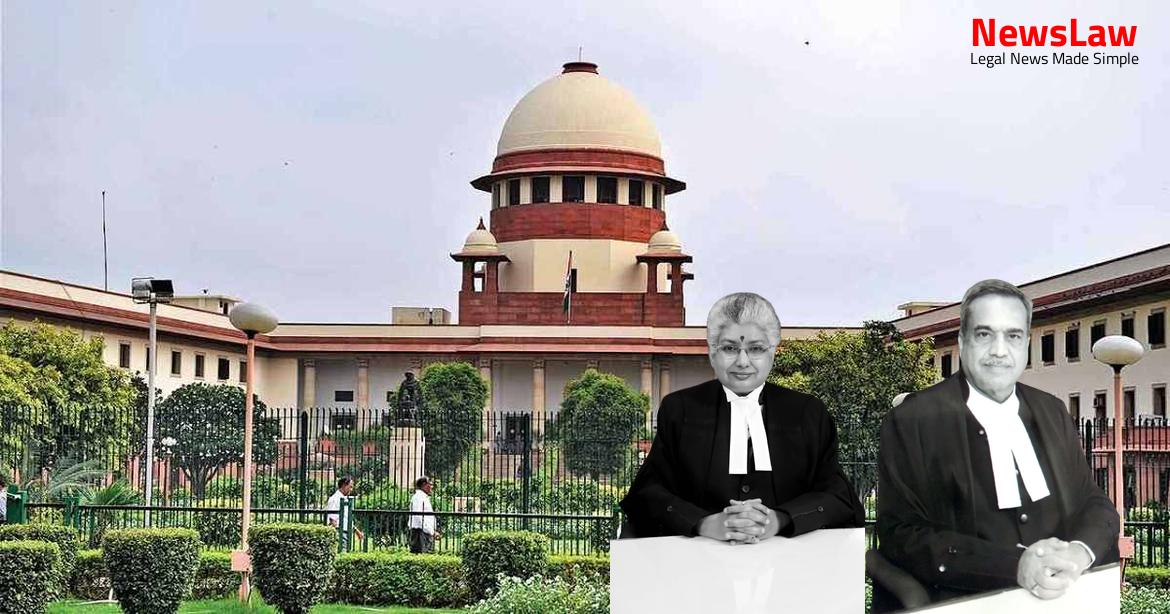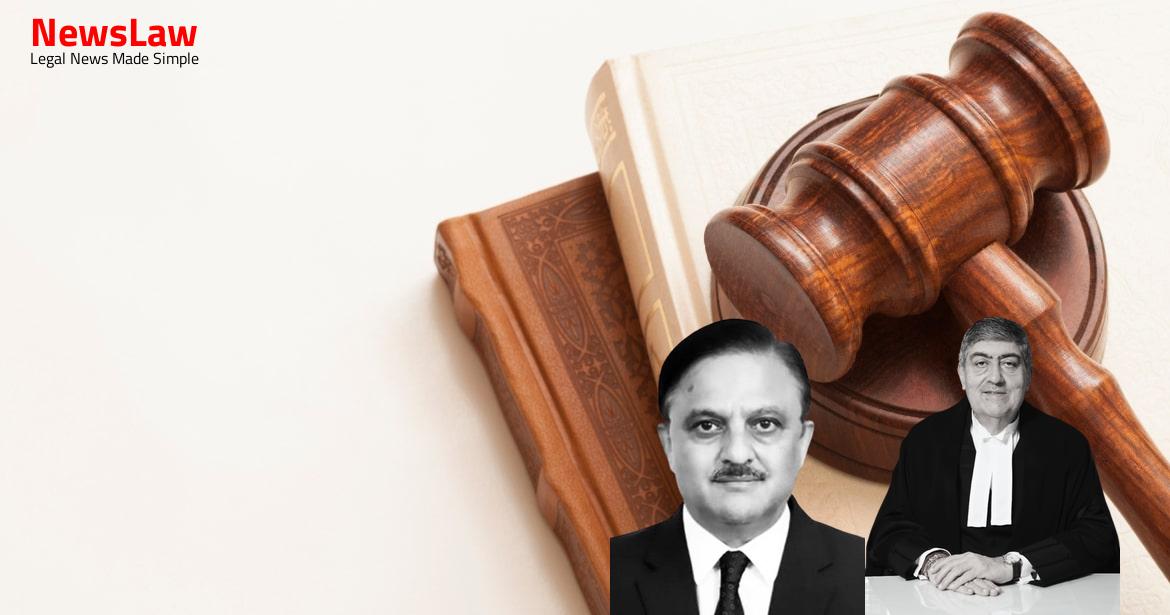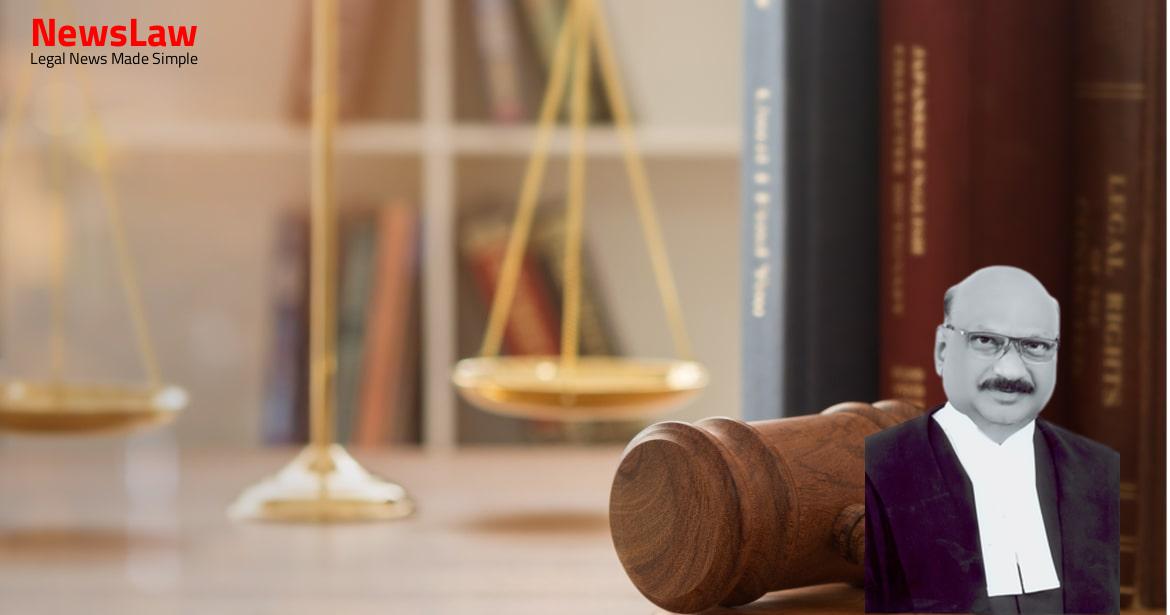Explore the intricate legal analysis conducted by the court in a recent case concerning the interpretation of the POCSO Act. The detailed examination of provisions and legal principles highlights the importance of precise statutory interpretation. This summary focuses on the court’s thorough analysis, providing valuable insights into the complexities of applying the law in cases involving sexual offenses against children. Stay tuned for a deep dive into the nuances of legal reasoning and interpretation.
Facts
- The High Court acquitted the accused-Libnus for the offence under Section 8 of the POCSO Act and convicted him for the minor offence under Sections 342 and 354 of IPC.
- The punishment for aggravated sexual assault includes imprisonment for a term not less than five years.
- The High Court modified the sentence imposed by the Special Court to the extent the accused had already undergone and directed to set him free.
- Stricter proof and serious allegations are required for fixing criminal liability for the offence of ‘aggravated sexual assault’.
- The act of pressing the breast of a child aged 12 years, without specific details like removal of clothing or insertion of hand, does not fall under the definition of ‘sexual assault’.
- The punishment for the offence of ‘sexual assault’ includes imprisonment for a term not less than three years but may extend to five years, along with a fine.
- Victim was left at home by her mother while she went to work.
- Accused tried to assault the victim in a room on the first floor of the house.
- Accused was identified as Libnus Fransis, a neighbor.
- Victim’s mother intervened when she heard shouts and found the accused assaulting her daughter.
- Accused bolted the door and attempted to assault the victim.
- Victim’s mother reported the incident to the police, leading to the filing of a charge-sheet against the accused.
Also Read: Electoral Malpractices in Mayor Election
Arguments
- Ms. Luthra argued that the Rule of Lenity would not be applicable in this case.
- Section 7 of the POCSO Act is divided into two parts, with a focus on sexual intent and physical contact.
- Mr. Dave emphasized the importance of proving the culpable mental state of the accused in both parts of Section 7.
- The State of Maharashtra, supported by Mr. Chitnis, raised concerns about the High Court’s interpretation of Section 7 negating the purpose of the POCSO Act.
- Various judgments from the US Supreme Court were referenced to highlight the potential societal impact of the misinterpretation of the Act.
- Mr. Luthra, representing the accused, argued against the misinterpretation and pointed out the specific nuances between IPC and POCSO Act offenses.
- The need for ‘sexual intent’ was stressed in interpreting Section 7, referencing other legal provisions for context.
- The issue of ‘ejusdem generis’ and the applicability of the principle were debated in the context of the POCSO Act.
- The importance of fulfilling the legislative intent of the POCSO Act and protecting children from sexual offenses was highlighted by Ms. Luthra.
- Definitions of ‘sexual intent,’ ‘touches,’ and ‘physical contact’ were discussed without being explicitly defined in the Act.
- Precedents from the Bombay High Court were cited to showcase the flexible interpretation of ‘sexual intent.’
- The distinction between IPC and POCSO Act offenses was underlined, advocating against a narrow interpretation that would defeat the Act’s purpose.
- Arguments were made against expanding the scope of the offense and the difficulty faced by the accused in proving innocence due to presumption and burden of proof.
- Relevant cases were referenced to support the strict interpretation of legal provisions and the application of the Rule of Lenity in favor of the accused.
- Mr. Luthra, senior counsel, highlighted contradictions in the evidence of the informant and witnesses.
- The oral evidence in both cases was deemed unreliable and sketchy.
- Argued that convicting the accused under the POCSO Act based on such evidence would be risky.
Also Read: Balancing Power and Transparency: Electoral Bonds Struck Down, Disclosure Mandated
Analysis
- Section 29 allows the Special Court to presume that a person prosecuted for certain offenses under the Act has committed the offense unless proven otherwise.
- Section 30 permits presumption of a culpable mental state for offenses under the Act, with the accused having the opportunity to prove otherwise.
- The Explanation to Section 30 clarifies what constitutes a culpable mental state.
- Acts falling under ‘sexual assault’ are defined in the Act, including specific actions and the general term ‘any other act’ under the principle of ‘ejusdem generis’.
- The definition of ‘sexual assault’ excludes acts like ‘holding hands’ or ‘opening a zipper’, as they do not fit the category.
- Section 8 states the punishment for sexual assault.
- The Act aims to protect children from sexual offenses like assault, harassment, and provide for special courts for trial.
- Detailed provisions related to sexual assault, aggravated sexual assault, sexual harassment, and their respective punishments are outlined in different sections of the Act.
- The Court accepted the consistent versions of the victim and her mother about the accused’s actions.
- The prosecution proved the alleged acts of the accused with sexual intent, including pressing the victim’s breast and attempting to remove her salwar.
- Statutory presumptions under the POCSO Act were applicable and not rebutted by the accused.
- The High Court erred in interpreting the acts of the accused as not falling under sexual assault under Section 7 of the POCSO Act.
- Discrepancies in the High Court’s judgment copies were noted, raising concerns about document authenticity.
- The impact of traumatic sexual assault on children was highlighted, emphasizing the seriousness of such offenses.
- Arguments regarding ambiguity in the definitions of ‘sexual intent’, ‘touching’, and ‘physical contact’ were discussed.
- Foreign court judgments and legal principles were referenced in the analysis.
- Issues with how the High Court interpreted ‘sexual intent’ and ‘touch’ were highlighted.
- The application of the Rule of Lenity was deemed misconceived in this context.
- The necessity for a bolder construction to bring about effective results in enforcing the law was emphasized.
- The importance of strict interpretation of the POCSO Act provisions in cases of sexual assault on children was reiterated.
- The interpretation of ‘touch’ and ‘physical contact’ under Section 7 of the POCSO Act was discussed.
- Concerns were raised about the High Court’s error in recording findings related to the accused’s offenses.
- The necessity for strict interpretation of the POCSO Act, considering its object and preventing abuse, was highlighted.
- The language used in law can be misunderstood even in ordinary conversations or correspondence.
- The law needs to be interpreted based on the subject matter of the offence and the objective it aims to achieve.
- The purpose of the law is not to allow offenders to escape legal consequences.
- Section 7 of the POCSO Act deals with acts involving sexual intent and physical contact without penetration.
- The definitions of ‘Touch’ and ‘Physical’ contact from dictionaries are considered in interpretation.
- Courts should not overly search for ambiguities in clear words.
- The suffering of victims may be immeasurable, but the law is to be strictly interpreted.
- A statute’s clauses should be understood in context with other provisions for consistent enactment.
- The intention of the legislature should be understood from the language used in the statute.
- The act of touching a child’s sexual part or any other act with sexual intent falls under ‘sexual assault’ in Section 7.
- The expression ‘sexual intent’ is not confined to a predetermined format, but is a question of fact.
- The term ‘physical contact’ does not necessarily mean ‘skin to skin’ contact.
- Reference to past judgments is made to interpret the law effectively.
- Failure to interpret the law effectively may lead to absurd results and defeat the purpose of the Act.
- Interpreting statutes involves understanding their subject matter and intended objectives.
- The court cannot reframe legislation but must interpret the law as intended by the legislature.
- Contextual reading is a well-known proposition for interpreting statutes.
- Courts should avoid narrow and pedantic interpretations that defeat legislative intent.
- The POCSO Act aims to protect children from sexual offences and provide adequate penalties.
- The Act was enacted to protect children’s rights and establish special courts for trial of such offences.
- International conventions and rights of the child were considered while enacting the POCSO Act.
Also Read: Recall of Resolution Plan Approval: Legal Analysis
Decision
- Accused directed to undergo rigorous imprisonment for three years and pay a fine of Rs.500
- Registrar General of the Bombay High Court to ensure proper procedure for preparing certified copies of judgments
- High Court’s judgement setting aside the conviction of the accused for offences under POCSO Act to be set aside
- Judgement and order of conviction by Special Court to be restored
- Judgements and orders of High Court quashed and set aside, those of Special Court restored
- All five appeals disposed of accordingly
Case Title: ATTORNEY GENERAL FOR INDIA Vs. SATISH (2021 INSC 762)
Case Number: Crl.A. No.-001410-001410 / 2021



